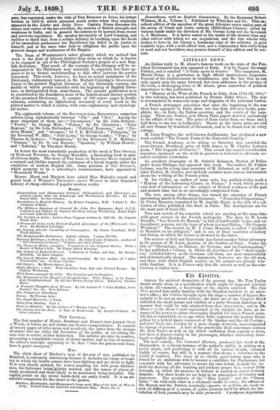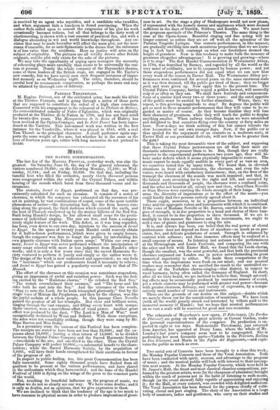142 (Orem.
Among the satirical dramatists of the present day, Mr. Tom Taylor stands nearly alone in a qualification which might be supposed inherent in them all—namely, a knowledge of the objects satirized. His Nice Firm proved him really familiar with the blunders incident to an attor- ney's office ; his Victims brought upon the stage a number of figures fre- quently to be met in actual society; the third act of the Unequal Hatch exhibited the small pomps and vanities of a petty German dukedom in a manner that could be only attained from close observation ; and in The Reuse? or the Home ? now represented at the Adelphi, we have an in- stance of his power to infuse thoroughly English life into a French story. All this is remarkable in an age when folks represent the modern Evan- gelical by a hybrid figure composed of the Quaker and the old Puritan ; and turn Paris into London by a mere change of streets, unaccompanied by change of persons. A love of the practically droll sometimes seduces Mr. Tom Taylor as well as his fellow craftsmen from comedy to farce, but there is always reality in his personages, whether elaborately deve- loped or slightly sketched. The new comedy, The Contested Election, produced this week at the Haymarket, is a strong instance of the author's ability in seizing on a social phase, and presenting it with all its various details, coloured highly of course, but still in a manner that shows a reference to the world of realities. The story of an elderly quiet-loving man, who is forced by an ambitious wife to become a candidate for Parliament, but conspires with his adversary to secure his own defeat, is made the ve- hicle for showing all the humbug and trickery proper to a corrupt little borough, in which the practice of bribery is carried on almost without disguise. For three hours we are kept in an atmosphere of venality and imposture. The presidents of the "Blue Lambs" and the "sTeen Lions" vie with each other in a wholesale traffic in votes ; the editors of the Beacon and the Patriot, nominally opposite in politics, are ready to sink all differences if a course of action presents itself by which the cir- culation of both journals may be alike promoted. A pompous deputation
is received by an agent who mystifies, and a candidate who twaddles, and when argument fails a luncheon is found convincing. When the author feels called upon to consult the exigencies of his plot his work occasionally becomes tedious, but all that belongs to the dirty work of electioneering, is shown with a vast amount of practical fun, and with a dialogue abounding in wit and world knowledge throughout Any ex- cision that may be made hereafter will affect the main plot, not the mor- ceaux d'ensemble, for so anti-Spinozistic is the drama that the substance is of less value than the accidents. Here no justice will arise on the subject of originality. The pictures are all vividly drawn after British originals, and the plot only exists for the sake of the pictures. We may take the opportunity of urging upon managers the necessity of rehearsing plays more carefully than seems to be universally the cus- tom at present. Nearly the whole company of the Haymarket theatre, some of them leaders of the British stage, are engaged in Mr. Taylor's new comedy, but we have rarely seen such frequent instances of imper- fect memory as on Wednesday night. The critic, therefore, should be careful how he recommends compression, as perhaps the same end may be attained by thorough care of delivery.



























 Previous page
Previous page